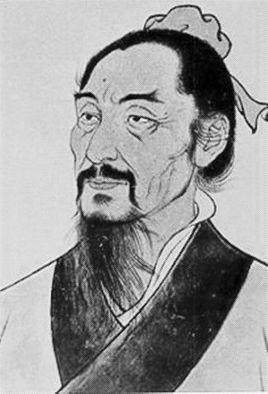Mo Zi (470 B. C.~391 B. C.) was a Chinese philosopher.
墨子(公元前470年~公元前391年),哲学家。
According to tradition, Mo Zi was originally a follower of the teachings of Confucius, until he became convinced that Confucianism laid too much emphasis on a burdensome code of rituals and too little on religious teaching, at which time Mo Zi decided to go his own way and finally evolved a doctrine of universal love that gave rise to a religious movement called Mohism.
按传统的说法,墨子最初是孔子教义的追随者,后来墨子确信儒家学说过于强调繁缉的礼仪,而对宗教教义强调极少,于是墨子决定自寻出路,最终发展成“兼爱”学说,从而创立了墨家思想。

Mo Zi's life, however, resembled that of Confucius in many important respects.
然而,墨子的生活在很多重要方面都与孔子相似。
He was widely read and well versed in the tradition of the Chinese Classics.
墨子的著述被广泛阅读,他精通中国经典。
Except for a brief period when he held public office. Mo Zi spent most of his life traveling from one feudal state to another in the hope of meeting a prince who would allow him to put his teachings into practice.
除了做了短期的公务人员之外,墨子一生大部分时间都在周游列国,希望能找到采纳自己政见的君主。
The Mo Zi, the principal Mohist work, condemned offensive war and urged people to lead a simple life harmful to none.
《墨子》是墨家主要著作。这本书谴责了攻击性的战争,力劝人们过简单无害的生活。
The gist of it is found in the three sets of chapters of its second section, which give an overview of the 10 major tenets: exaltation of the virtuous, identification with the superior, universal love, condemnation of offensive war, economy of expenditures, simplicity in funerals, will of heaven, on ghosts, denunciation of music as a wasteful activity, and antifatalism.
《墨子》要点在中篇的三组文章里。这些要点给出了十大命题: “尚贤”、“尚同”、“兼爱”、“非攻”、“节用”、“节葬”、“天志”、“明鬼”、“非乐”、“非命”。
Since Mohism split into three schools after Mo Zi's death, the three sets of chapters may well represent the three sets of texts preserved by the three schools.
墨子去世后,墨家学派一分为三,《墨子》三篇被认为是“三墨”各自所依据的经典。
The other sections of Mo Zi might be listed as follows: First , summaries and abstracts of Mo Zi's teachings; Second, discussions on logic and physical sciences; Third, records of Mo Zi's doings and sayings; Finally, a manual of military defense.
《墨子》的其它部分是:一,墨子教义的总结和摘要; 二,逻辑思想和物理科学; 三,墨子的言行记录; 四,守城技巧与城防制度。











